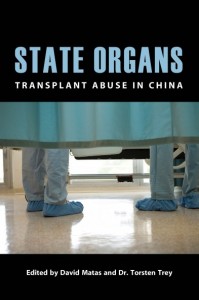Taiwanese Groups Condemn Organ Harvesting in China
The Epoch Times
By Zeng Yihao & Chen Zhen
New Tang Dynasty Television
On Feb. 27, the Taipei Bar Association hosted a roundtable discussion in response to the recently published book State Organs, which discusses transplant abuse by the Chinese regime.

Afterwards, the Taipei Bar Association issued a public statement condemning the Chinese Communist Party’s involvement in organ harvesting—a step not before taken by a bar association.
The statement calls for the Chinese regime to release all prisoners of conscience, and requests that the Taiwanese government and other governments implement legislation to prohibit organ transplantation using organs from illicit sources.
With an invitation from the Taiwan International Care Association for Organ Transplants, a co-editor of the book State Organs, human rights lawyer David Matas, went to Taiwan to talk about the CCP’s program of live organ harvesting from executed prisoners and prisoners of conscience, particularly Falun Gong practitioners. His discussions were part of an effort to jumpstart the process of forming legislation on the matter in Taiwan.
Recently, the Australian politician David Shoebridge put forward a draft bill amendment that would criminalize receipt of trafficked organs. Experts thought it would be most immediately relevant to the PRC, given its widespread use of prisoners for organs.
The Taipei Bar Association, the largest bar association in Taiwan, hosted the discussion. David Matas, author and Canadian human rights lawyer, as well as former Canadian Cabinet Minister and Crown Prosecutor David Kilgour, attended with other experts and lawmakers.
The Taipei Bar Association Committee for Human Rights, with endorsement by the bar’s board members, released a statement condemning the CCP’s conduct. The statement is expected to help pave the road for later legislation.
Mr. Weng Kuo-Yen, lawyer and Chairman of the Taipei Bar Association’s Committee for Human Rights, said, “We especially do not wish to see Taiwanese people traveling to mainland China for organ transplants, thus becoming co-conspirators in the CCP’s criminal enterprise of illegal organ harvesting.”
David Matas and David Kilgour, co-authors of the book Bloody Harvest, investigated over 50 organ recipients, including those from Taiwan, who went to China for organ transplants. Quoting from that book, David Kilgour read, “Four more sets of kidneys were tried out, until the 8th set of kidneys worked, were compatible. He is doing fine now, but you can imagine eight human beings, probably Falun Gong practitioners, at least some of them, have been killed, murdered, if you like … .”

On Feb. 25, Matas said to listeners of Radio Taiwan International that although many changes have taken place since the CCP’s organ harvesting was exposed seven years ago, the crime of organ harvesting is continuing, and a global effort to end it is necessary.
Taiwan is currently going through inspections for the Country Report on Human Rights Practices, and the Taipei Bar Association’s statement has been sent to multiple human rights organizations. However, Beijing is pressuring the Taipei Bar Association, according to attorney Theresa Chu, spokesperson for the Falun Gong Human Rights Lawyer Group.
Chu says, “Nothing more than a piece of A4 paper has put Beijing on edge. I think our Bar Association has power. More than 80 percent of Taiwanese patients receive organs from mainland China. This is a huge dilemma. If we don’t have proper legislation, as legal professionals, we have not done our jobs.”
Many attorneys attended the discussion, with doctors from Malaysia and Israel speaking out against transplant abuse in China. Former President of the Taipei Bar Association, Yu Mei-nu, and Taiwan legislator Huang Wen-ling also attended. Several of the experts attending the Taipei Bar Association’s recent meeting will also attend another international symposium hosted by the Taiwan Department of Health, on March 28, to further emphasize the importance of legislation against abusive organ harvesting.
The International Care Association of Organ Transplants in Taiwan also held a forum with Kilgour, Matas, and others as speakers. They released a statement of recommendations at the conclusion of the forum, suggesting that Taiwan increase the number of volunteer donors, and make criminals penalties for the recipients of trafficked organs.
Read original Chinese article.
The Epoch Times publishes in 35 countries and in 21 languages. Subscribe to our e-newsletter.
